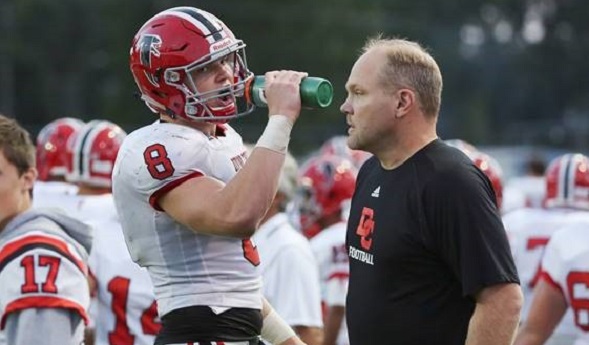
Hutchinson Makes Name at Divine Child
By
Tom Markowski
Special for Second Half
September 13, 2017
DEARBORN – Often, a child of a successful athlete has difficulty living up to that standard.
 To this point, that’s not the case with Aidan Hutchinson.
To this point, that’s not the case with Aidan Hutchinson.
He plays a similar position as did his father Chris, an All-America defensive lineman at University of Michigan in 1992. But there are differences as well between father and son – although like his dad, Aidan also will head to Ann Arbor after he graduates from Dearborn Divine Child.
All Falcons fourth-year coach John Filiatraut knows is that he hit the lottery when the Hutchinsons decided Aidan would attend Divine Child – not that he didn’t see it coming, given Aidan’s mother, Melissa Hutchinson, and his two older sisters, Mia and Aria, all attended the Catholic school.
“They’re great people,” said Filiatraut, a 1986 Divine Child graduate. “It’s a treat. Coaches can complain and whine with the best of them. But we’re lucky to have Aidan.
“And Chris is not very intrusive. I was worried about that at the beginning. With his background, it would be easy to step in. We as coaches are trying to do things right here. (Chris) is committed to Aidan and for him to do this on his own, and not cast a shadow on Aidan.”
Coming off its winningest season (10-3) since 1985 and a Division 3 Semifinals berth in 2016, Divine Child is off to a 3-0 start this fall.
As for those differences between father and son, size is one. The elder Hutchinson was 6-foot-2 and weighed 221 pounds when he graduated from high school. His playing weight at U-M was 250. His son is 6-6 and weighs 255 pounds, and is considered one of the top prospects in the class of 2018. Aidan plays defensive end and tight end. His father was a defensive tackle.
Chris Hutchinson grew up in Houston and played football at Cypress Creek High before going on to University of Michigan, where he played four seasons and was named first team All-America as a senior defensive lineman in 1992. Chris Hutchinson said private school education was all new to him, but he couldn’t be more pleased with the educational – and now with his son – athletic experiences his family has enjoyed.
Not surprisingly, Aidan has accepted a scholarship offer to attend U-M. He did make unofficial visits to Notre Dame and Wisconsin, in addition to his interest in attending Penn State, but eventually U-M won out.
 And so far his senior season has unfolded as planned.
And so far his senior season has unfolded as planned.
“We’re 3-0. It’s great,” he said. “Michigan is undefeated. We’re undefeated. It’s all great.”
Chris Hutchinson didn’t allow Aidan to play tackle football until he was in the seventh grade. Aidan did play flag football, and other sports like soccer, but his father held him out of the physical contact until he thought Aidan was ready.
“It was a big change for me,” Aidan said of playing tackle football. “I had to learn a lot because most of the other kids had been playing two or three years. It wasn’t too bad a transition. I just had to learn quickly.”
Despite his size, and his weight as an infant (11 pounds, one ounce), Aidan wasn’t a large child growing up. He weighed 135 pounds when he was in the eighth grade, then 160 as a freshman playing on the line on Divine Child’s junior varsity team. Over the next two years, he grew seven inches and added 70 pounds.
“I’ve been (growing) all through high school,” he said. “Am I done growing? I don’t think so, but I’m hoping I am.”
The answer is likely the former. Aidan just turned 17 last month (Aug. 9).
Though his size is a plus once he gets to college, there are times when it can work against him at the high school level.
“It’s different when you’re 6-6 going against a 6-foot kid,” Chris Hutchinson said. “You have to keep your head down, and stay low.”
Chris Hutchinson, who’s a doctor in the emergency room at Beaumont Hospital in Royal Oak, understands it’s not his place to coach his son from the sideline, even though, as the team physician, it’s his job to be on the sideline. He keeps a safe distance and allows Filiatraut and his staff do their jobs.
At home, it’s a different story. The two view film constantly to determine where improvements can be made.
“Thank God for Hudl,” Chris said. “I only focus on technique. When Aidan tells me they’re using a double team, I ask what type? There are different ways you can use a double team.
 “It’s important not to be that dad who coaches. There are way too many dads who do the coaching thing. The hardest thing for me is not to say something, and have him come to me. When they do ask, then you can go forward.”
“It’s important not to be that dad who coaches. There are way too many dads who do the coaching thing. The hardest thing for me is not to say something, and have him come to me. When they do ask, then you can go forward.”
Aidan is quick for his size, and he attributes much of that quickness and his ability to react quickly to the other sport he plays, lacrosse. He started playing lacrosse the same year he began playing tackle football, and to him they go hand in hand.
“It’s a ton of fun (playing lacrosse),” he said. “My whole group of friends play. All six of us started (on varsity) as freshmen, so we should be pretty good this year. There’s no question it helps me in football. One hundred percent. It helps with my hip movement, and in lacrosse it forces you to back pedal.”
Filiatraut said Hutchinson is a special part of a special team at Divine Child. Its quarterback, Theo Day, is one of the state’s best. Day led the Falcons to the Division 3 Semifinals last season and has committed to sing with Michigan State.
“Aidan gives great effort all of the time,” Filiatraut said. “Honestly, he’s on the shy side. He’s trying to figure it all out. He’s doing his best to be a vocal leader, but it’s not in his nature.
“He’s got a ton of want-to. He wants to be good, and to get better.”
 Tom Markowski is a columnist and directs website coverage for the State Champs! Sports Network. He previously covered primarily high school sports for the The Detroit News from 1984-2014, focusing on the Detroit area and contributing to statewide coverage of football and basketball. Contact him at [email protected] with story ideas for Oakland, Macomb and Wayne counties.
Tom Markowski is a columnist and directs website coverage for the State Champs! Sports Network. He previously covered primarily high school sports for the The Detroit News from 1984-2014, focusing on the Detroit area and contributing to statewide coverage of football and basketball. Contact him at [email protected] with story ideas for Oakland, Macomb and Wayne counties.
PHOTOS: (Top) Deaborn Divine Child’s Aidan Hutchinson grabs a water break while dad and team physician Chris Hutchinson keeps an eye on the field. (Middle) Hutchinson blocks against Benton Harbor during his team’s Week 1 win. (Below) Aidan, Chris, mom Melissa and U-M coach Jim Harbaugh take a photo after Aidan commits to sign with the Wolverines. (Photos courtesy of the Hutchinson family.)
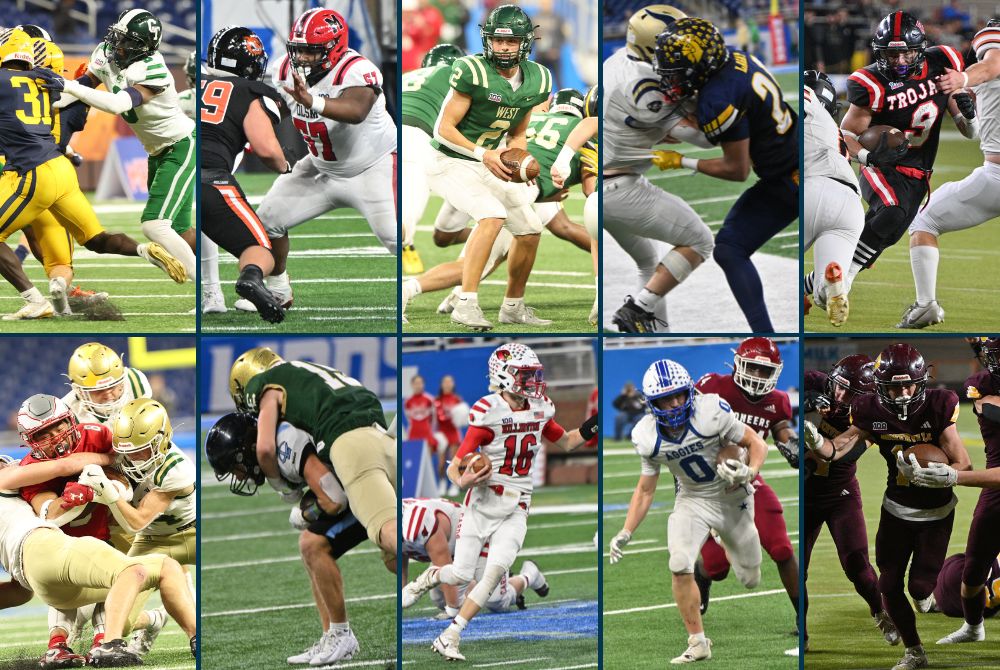
1st & Goal: 2024 Finals in Review
By
Geoff Kimmerly
MHSAA.com senior editor
December 4, 2024
The story of the 50th MHSAA Football Playoffs may have been driven as much by the run-up to the Finals of these last two weekends as by those 10 championship games themselves.
 But those games at Ford Field and the Superior Dome left us with their shares of unforgettable moments as we celebrated another special moment of this overall 100th MHSAA anniversary.
But those games at Ford Field and the Superior Dome left us with their shares of unforgettable moments as we celebrated another special moment of this overall 100th MHSAA anniversary.
Goodrich, Pontiac Notre Dame Prep and Millington celebrated championships for the first time. Jackson Lumen Christi moved into first all-time with its 14th Finals title. The average margin of victory may not have been close this time around – winners did so by nearly 24 points, and we had just one single-digit game out of 10 – but consider as well the excitement generated on the way to these concluding weekends. Of the 20 teams ranked Nos. 1 or 2 by the Michigan High School Football Coaches Association at the end of the regular season, only five reached championship games – and only three won them.
We had senior standouts rewrite the scoring side of our 11-player Finals record book, star quarterbacks face off in an 8-player classic, and an uncountable number of unforgettable moments as nearly 45,000 fans traveled to witness the beginnings of our latest trophy celebrations.
MHSAA.com once again covered all 10 championship games, with quick recaps and links to those stories below followed by notations of performances entered into the MHSAA Finals record books and a report on some of the main storylines to emerge as those championships were being decided.
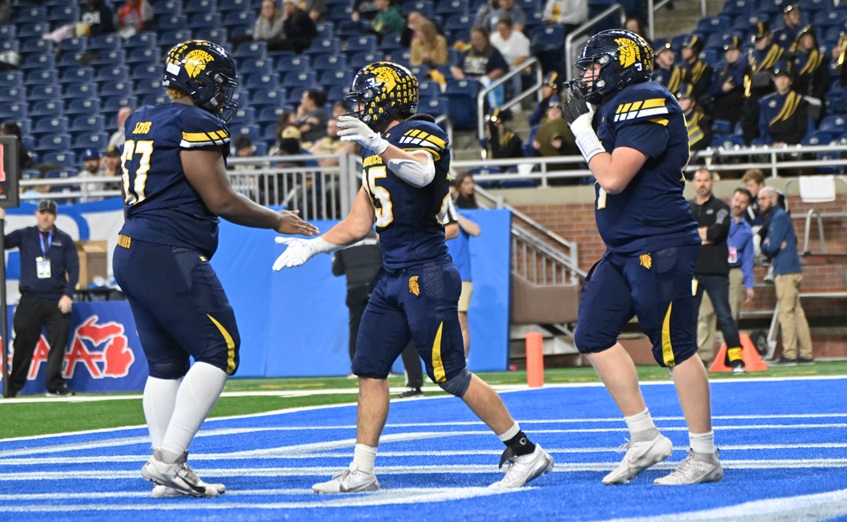
Finals in Review
11-Player Division 1: Detroit Cass Tech 42, Hudsonville 20 – Read
The Technicians won their fourth championship and first since 2016 by shutting down Hudsonville’s powerful rushing attack and dominating the air with freshman quarterback Donald Tabron II completing 15 of 20 passes for 176 yards and three touchdowns to arguably the top receiving group in the state. Cass Tech built a 35-0 lead by a minute into the second half.
11-Player Division 2: Orchard Lake St. Mary’s 35, Byron Center 19 – Read
Orchard Lake St. Mary’s also won its first championship since 2016 with a mostly second-half burst after trailing 13-7 until the final minutes of the second quarter. Darrin Jones and Bryson Williams both ran for more than 100 yards and a pair of touchdowns as the Eaglets also shut down a Byron Center offense that averaged nearly 40 points per game entering championship weekend.
11-Player Division 3: Zeeland West 42, Detroit Martin Luther King 22 – Read
Paced by a record-setting performance by running back Keaton Hendricks, Zeeland West and its T-formation attack defeated a fourth top-seven ranked team during this playoffs. The Dux presented a look King hadn’t seen in years and turned it into not only a 352-295 total yardage advantage but also a 30:10-17:50 edge in time of possession as it piled up points against a King defense that had given up just 13.6 per game on the way to the Final.
11-Player Division 4: Goodrich 35, Niles 6 – Read
Goodrich won this matchup of finalists seeking their first championship, dominating the line of scrimmage to the tune of a 424-96 advantage in total yardage. Chase Burnett did the most damage of a talented Martians group of playmakers, running for 157 yards and a pair of scores while their defense locked down a Niles attack that averaged 41 points per game entering this matchup.
11-Player Division 5: Pontiac Notre Dame Prep 42, Frankenmuth 7 – Read
This also featured a pair of first-title hopefuls, and Notre Dame Prep took one home coached by Pat Fox, who grew up in and has since moved back to Frankenmuth. Quarterback Sam Stowe starred for the Fighting Irish, throwing four touchdown passes as NDP took a 35-0 lead into the fourth quarter and frustrated a Frankenmuth attack that had outscored its opponents by 31 points per game.
11-Player Division 6: Jackson Lumen Christi 56, Lansing Catholic 18 – Read
Lumen Christi’s record-setting win came on a record-setting performance by running back Kadale Williams, who ended up with a combined 590 yards and eight rushing touchdowns over his last two Finals appearances after also carrying the ball once in the Titans’ 2022 championship game. Lumen’s title was its third-straight with the first two of this string coming in Division 7
11-Player Division 7: Millington 24, Monroe St. Mary Catholic Central 0 – Read
Millington finished its first championship run as also the only undefeated 11-player champion this season. The Cardinals were physically dominant as they posted their fifth shutout and lowered their points allowed per game average to 7.7. In this win, they allowed just 3.2 yards per carry and forced three turnovers, limiting an SMCC offense averaging 36 points per game entering the weekend.
11-Player Division 8: Beal City 43, Riverview Gabriel Richard 14 – Read
Physical play and a strong running game were the story of this championship decider as well as Beal City won its third title and first since 2009 behind 315 rushing yards. The Aggies strung together unanswered runs of 21 and 17 points and held Gabriel Richard scoreless for the final 22 minutes of the first half and final 12 of the second.
8-Player Division 1: Deckerville 30, Pickford 28 – Read
Pickford led until the opening seconds of the fourth quarter as Deckerville came back from a double-digit third-quarter deficit to win its first championship since 2012. Both teams entered the matchup undefeated, and both relied on star quarterbacks who wrote their names into the Finals record book.
8-Player Division 2: Crystal Falls Forest Park 42, Morrice 20 – Read
The Trojans played in their 15th championship game and won for the fifth time after taking a 28-0 lead into the break and running for 184 of their total 291 yards during the first two quarters. Coach Brian Fabbri, who had played for Forest Park in 11-Player Finals in 2004 and 2005, became the fourth title-winning coach in program history.
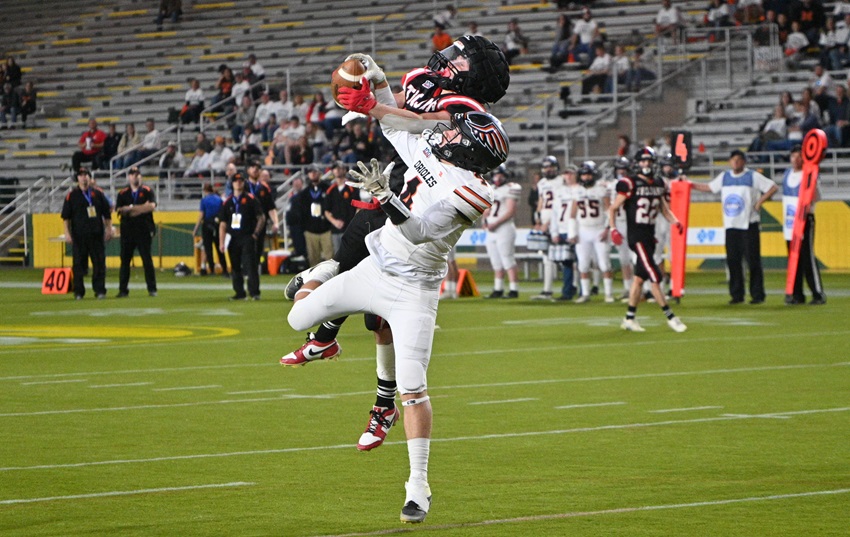
Records Report
Zeeland West senior Keaton Hendricks scored a Finals record six touchdowns – to also give him a Finals-record 36 points. He rushed for three and caught three scores, and the three receiving touchdowns tied for second-most on that list.
Before Hendricks’ accomplishments a day later, Jackson Lumen Christi senior Kadale Williams briefly sat atop four record book lists. He remains the record holder with 314 rushing yards and five rushing touchdowns and sits tied for second with five total touchdowns and 30 points scored in a championship game. His 314 rushing yards also put him on the total yardage list.
Junior quarterback Sam Stowe directed Notre Dame’s offense during the championship drive, reaching the record book with 293 yards passing and four touchdowns through the air including one score on one of the longest completions in Finals history – 87 yards to Billy Collins. Stowe also ran for eight yards, making the total yardage list with 301.
Lansing Catholic senior quarterback Alex Fernandez earned multiple record listings with 284 passing yards, 21 passing completions and 366 total yards; he also ran for 82. Senior receiver Xavier Luea tied for the fifth-most receptions in a championship game, pulling in 10 for the Cougars.
Four kickers reached the record book list for most extra points in one game. Jackson Lumen Christi senior Andy Salazar tied two others for the record with eight extra points, making all eight kicks he took in the Division 6 Final. Notre Dame Prep junior Owen Fulsher made six extra points in six attempts, and Orchard Lake St. Mary’s freshman Beckett Kiefer, Beal City senior Kyle Martin and Goodrich senior Landon Williams all made the list with five extra points in five tries.
As noted above, Jackson Lumen Christi set a record for championships with 14, breaking its tie with Farmington Hills Harrison (which closed at the end of the 2018-19 school year). Lumen scored 42 points during the first half of its Division 6 win, tying for third-most in one half, and its 56 total points tied for second-most for a full title game. The Titans also tied a record with seven rushing touchdowns total and made the list – with Niles in Division 4 as well – for fewest pass attempts, with three.
Lansing Catholic made the team list for most pass completions with 21, and Notre Dame Prep made the team list for passing yards with 293.
As seems to make sense with some of our winning teams’ offensive successes, four made the list of those to not punt during a Final – Zeeland West, Beal City, Goodrich and Jackson Lumen Christi. West also combined with Detroit Martin Luther King, and Beal City with Riverview Gabriel Richard, to make the list for fewest punts by both opposing teams combined. Both pairs had just one in their games.
Although in defeat, Pickford senior quarterback Tommy Storey was one of the stars of the 8-Player Finals, making lists with four total touchdowns, 304 rushing yards (ranking second), four rushing touchdowns and 312 total yards. His opposing quarterback, Deckerville senior Hunter Garza, also made multiple lists with 323 total yards and 225 rushing.
Crystal Falls Forest Park sophomore Dietrich Rasner made the extra points list, tying for second with six in six attempts, and Morrice senior Joel Fisher had the second-longest punt return in 8-Player Finals history bringing one back 85 yards for a score.
Pickford and Deckerville both reached 300 yards rushing in the Division 1 game, Pickford with 322 and Deckerville just missing the record book yardage list but setting a record with 60 rushing attempts. Deckerville also made the first downs list with 21.
Crystal Falls Forest Park made a rushing list, with six touchdowns running the ball. The Trojans also set a record by not allowing Morrice to gain a yard passing – with the Orioles becoming the first 8-player team to not complete a pass in a Final, attempting just four.
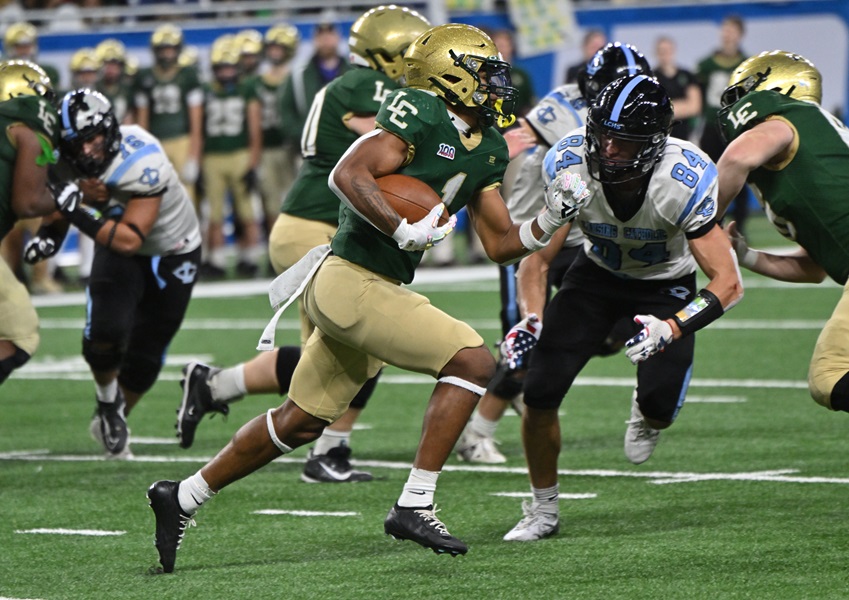
Stories Behind the Scores
Lumen Legend: Of Jackson Lumen Christi’s now-14 Finals championships, 12 came under the leadership of coach Herb Brogan, who took over the program in 1980 after Jim Crowley led the Titans to titles in 1977 and 1979. They finished this season 13-1, putting Brogan’s career record at 421-96. He’s third in football coaching wins in Michigan high school history, trailing Al Fracassa (Royal Oak Shrine Catholic/Bloomfield Hills Brother Rice) by nine and John Herrington (Farmington Hills Harrison) by 22. Brogan’s all-time winning percentage of .814 has him fourth all-time on that list for coaches with at least 200 victories.
Welcome to the Finals: Of the 20 teams that played in championship games (11 and 8-player combined), only Lumen Christi was returning from 2023. Compare that to two years ago, when we had four repeat champions, or last year with six returning teams and two repeat champs. Over the last two weekends, five teams played in championship games for the first time, and as mentioned above, three celebrated their first titles.
Return of the Rush: Wide-open pass-heavy offenses have been a trend going on two decades. But the ground game may be making a comeback. Lumen Christi’s Williams set the individual rushing record in his team’s win over Lansing Catholic, and it’s fair to consider the offenses of at least 15 of the 20 finalists (11 and 8-player combined) as rush-based. Six teams reached 300 yards rushing in championship games, with Lumen leading the way with 435 on 47 carries.
MHSAA.com's weekly “1st & Goal” previews and reviews are powered by MI Student Aid, a division within the Department of Lifelong Education, Advancement, and Potential (MiLEAP). MI Student Aid encourages students to pursue postsecondary education by providing access to student financial resources and information. MI Student Aid administers the state’s scholarship and grant programs that help make college Accessible, Affordable and Attainable for you. Click to connect with MI Student Aid and find more information on Facebook and Twitter @mistudentaid.
PHOTOS (Top) This collage shows action photos from all 10 MHSAA Finals played this season. (2) Goodrich's Chase Burnett, middle, celebrates his touchdown with two of his linemen. (3) Forest Park and Morrice players get tangled up jumping near the goal line to pull down a pass. (4) Lumen Christi's Kadale Williams (1) works to get to the edge against Lansing Catholic. (11-player photos by Hockey Weekly Action Photos; 8-player photos by Cara Kamps.)

